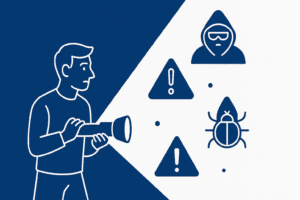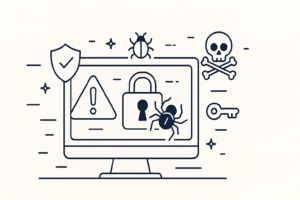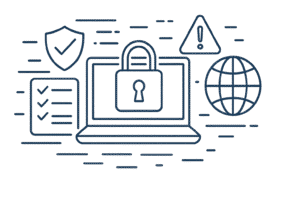Introduction to Website Security Meaning
Why Website Security Meaning Cuts Through the Jargon
Every time you Google “SSL,” “firewall,” or “malware prevention,” you get hit with a firehose of buzzwords—none of which tell you what website security meaning actually means. Let’s be honest: most online posts on this topic are fluff masquerading as insight. As someone who’s been in the trenches since dial‑up was a thing, I’m sick of the buzzword bingo. So let’s rip off the Band‑Aid and get crystal clear on the real website security meaning—no smoke, no mirrors, just the en‑gritty truth.
Why Website Security Matters
Understanding website security meaning isn’t a checkbox on your to‑do list; it’s the blueprint that keeps your site—and your sanity—intact. If you treat website security meaning like an afterthought, you’ll end up with:
- Data Leaks: Because you mistook “install a plugin” for “actually secure your data.”
- Reputation Ruin: One breach and your brand’s credibility vanishes faster than free storage on a cloud plan.
- Wallet Drain: Pouring dollars into gimmick‑laden solutions that miss the mark on true website security meaning.
Grasping the true website security meaning means you understand which defenses matter, why they matter, and how they interlock to form a rock‑solid perimeter around your digital assets.
What You’ll Learn About Website Security
By the time you’re done reading this, you’ll be able to recite website security meaning in your sleep. Here’s what’s coming your way:
- Crystal‑Clear Definitions of Core Concepts: We’ll demystify SSL, firewalls, secure coding, and more—tying each back to the overarching website security meaning.
- Myth‑Busting Insights: Ready to call bull on common misconceptions around website security meaning? We’ll tackle the top five myths head‑on.
- Historical Evolution: From ancient CGI scripts to today’s serverless functions, see how website security meaning has adapted as the web matured.
- Real‑World Case Studies: Actual examples where savvy grasp of website security meaning thwarted attacks—or where ignorance led to spectacular failure.
- Actionable Roadmap: No vague “do this, do that.” You’ll get step‑by‑step actions grounded in the genuine website security meaning you need to survive—and thrive—online.
Buckle up. This isn’t your average fluff piece. We’re going deep on the website security meaning that really matters—and by the end, you’ll know exactly how to wield that knowledge like the seasoned pro you are.
Ready to stop wrestling with half‑baked tutorials and finally get a site that looks great and locks down your data? We’ve built this agency on crafting pixel‑perfect websites with security baked in from day one. Whether you need a sleek portfolio, a conversion‑focused storefront, or a custom CMS that won’t burn down at the first exploit, we handle the design, dev, and defense so you can focus on your business—not patching holes at 2 AM. Let’s give your brand the professional face it deserves and the rock‑solid security it demands. Contact us today for a free consultation and see why building with us is more than just “pretty pages”—it’s smart, secure growth.
Defining Website Security Meaning: What It Is (And Why It’s More Than Just a Buzzword)
Breaking Down the Components of Website Security (And How They Shape Website Security Meaning)
When we say website security meaning, we’re talking about the full, multi-layered armor your site needs—not just one shiny gadget. Think of it as building a medieval fortress, not a single drawbridge. Let’s tear down these walls, brick by brick:
- Encryption (SSL/TLS):
Encryption is like sending your postcards in a locked safe instead of scribbling them on Yelp. When you hear website security, the first pillar is SSL/TLS—those certificates that upgrade HTTP to HTTPS. They scramble the data between user and server so eavesdroppers end up with gibberish. Without encryption, you’re basically broadcasting your customers’ passwords on loudspeaker. - Firewalls:
If encryption is your locked safe, consider a firewall your moat and drawbridge. A firewall examines every packet of data—good or bad—against a rulebook you set. Picture a bouncer at an exclusive nightclub who lets VIPs in and chucks out the riff-raff. In the grand tapestry of website security meaning, firewalls are indispensable for stopping the hordes before they even reach your gates. - Secure Coding Practices:
You wouldn’t build a castle with holes in the walls, right? Secure coding is the blueprint that avoids those gaps—anticipating traps like SQL injections (where attackers sneak in malicious database commands) or cross-site scripting (XSS), which hijacks user sessions. Following OWASP’s Secure Coding Practices is like hiring master stonemasons who know exactly where to place each block for optimal defense. - Access Control:
Not everyone gets the skeleton key to your castle. Access control defines who can roam the courtyard and who stays outside the ramparts. Granular permissions—giving “just enough” access—ensure that your intern can’t accidentally (or intentionally) torch the place. Proper access control is a cornerstone of the deeper “website security meaning” you can’t afford to ignore. - Regular Updates and Patching:
Old software is like ancient mortar—crumbling under pressure. Updates and patches fill security holes faster than you can say “0-day exploit.” Embracing regular updates is part of the ethos of website security meaning: it’s not a “set it and forget it” deal but a continual process of reinforcing your defenses. - Backups:
Even the sturdiest fortress can be overwhelmed; backups are your secret escape tunnels. Should disaster strike—ransomware, rogue developer, cosmic ray—you need a reliable backup to reset the clock. In the lexicon of website security meaning, backups represent the last line of defense, ensuring you can rebuild and bounce back without missing a beat.
Debunking Common Myths Around Website Security
Let’s pop the most persistent website security meaning myths—so you stop wasting time on fairy dust fixes.
- Myth: “SSL alone makes my website secure.”
Truth: SSL is the “S” in HTTPS, yes, but it only guards data in transit. It doesn’t protect your site from malware, brute-force attacks, or phishing scams. SSL is vital, but it’s only one spoke on the wheel of true website security meaning. - Myth: “If I’m small, hackers won’t target me.”
Truth: Hackers don’t discriminate; they run bots that scan millions of sites for any outdated plugin or open port. In fact, small sites are prime targets because they’re usually under‑protected. Believing size offers safety is a rookie move in website security meaning. - Myth: “Security is a one-time setup.”
Truth: If your idea of security is ticking a few boxes and moving on, congratulations—you’ve just declared open season. Website security meaning demands ongoing vigilance: patches, audits, monitoring. Treat it like brushing your teeth, not once in a lifetime. - Myth: “Free tools are enough for full protection.”
Truth: Free tools can handle basic chores, but they often lack real-time monitoring, robust support, and advanced features. Relying solely on freebies can leave gaping holes in your defenses—definitely not aligned with the comprehensive website security meaning you need to truly safeguard your site.
Armed with these debunks, you’re no longer a rookie believing in fairy tales. You understand the real website security meaning: a strategic, layered approach to defense—no fluff, just rock‑solid strategyTop of Form
Bottom of Form
.
The Evolution of Website Security Meaning
From Dial‑Up Days to Modern Data Breaches: How Website Security Has Changed
Back in the ‘90s—when a dial‑up tone meant you were about to log into your GeoCities page— website security was basically “Don’t let people guess your password.” Sites were static HTML brochures, and the notion of catastrophic data breaches was about as real as flying cars. Fast forward to 2025, and every click, form submission, and API call can be a potential backdoor exploit. Today, eCommerce stores, social networks, and cloud services trade terabytes of sensitive data every minute, making website security meaning a life‑or‑death concern—even for hobby blogs.
Historical Context:
- Early Internet Era (1990s–Early 2000s): Security meant “password123, good enough.” Firewalls were clunky, and HTTPS was reserved for giant banks. The most serious attacks were defacements—some teen might replace your homepage with a “Hacktoberfest” message.
- Web 2.0 Rise (Mid‑2000s–2010s): Dynamic sites, user accounts, and databases exploded. Suddenly, SQL injections and XSS were headline material. Developers began to realize that website security meaning had to include code hygiene and server configuration.
- Cloud & Mobile Explosion (2010s–Today): With data everywhere—on smartphones, in cloud services, and streaming between microservices—attackers could run automated bots to probe millions of sites in seconds. The game shifted: it wasn’t just about locking the front door but fortifying every window, chimney, and secret tunnel.
Philosophical Shift:
Website security meaning used to be a checklist item: “Enable SSL, install a firewall, good to go.” Now it’s a living, breathing risk management strategy. You need continuous monitoring, threat intelligence, and a plan B (and C) for when your fortress gets tested. The focus isn’t just on building walls, but on detecting spies, patching crumbling battlements, and adapting tactics as the siege engines evolve.
Modern Threats That Redefine Website Security
If you think the worst hackers do is spray‑and‑pray defacements, think again. Today’s cybercriminal toolkit is a buffet of sophisticated weapons that demand a deeper understanding of website security meaning:
- Advanced Malware and Ransomware:
Gone are the days of simple viruses—modern malware can hide in encrypted payloads, evade basic antivirus scans, and lie dormant until triggered. Ransomware gangs have turned data encryption into high-stakes extortion, locking down your entire site (and backups, in some cases) until you pay. Understanding website security meaning now requires robust malware detection, behavioral analysis, and immutable backup strategies. - Automated Bots and Zero‑Day Exploits:
Bots don’t sleep. They crawl, scan, and exploit known vulnerabilities—sometimes within minutes of a patch release. Zero‑day exploits, too, strike before anyone even knows the flaw exists. A true grasp of website security meaning involves real-time monitoring and rapid patch deployment, coupled with proactive vulnerability hunting to stay one step ahead. - Phishing and Social Engineering:
Even Fort Knox could fall if someone hands over the keys. Phishing attacks—luring users to fake login pages or tricking staff into revealing credentials—exploit human weaknesses. No amount of technical wizardry replaces the need for ongoing security training and awareness programs. Business leaders must view website security meaning as encompassing both code and culture—because a single misplaced click can nullify your best defenses.
Together, these modern threats have elevated website security meaning from a static buzzword to a dynamic, multi‑facet discipline—one that demands constant vigilance, technical finesse, and a healthy dose of skepticism toward claims of “set it and forget it” security solutions.
Real‑World Implications of Website Security Meaning
Website security meaning isn’t just an academic buzz phrase—you either live it or you learn it the hard way. Failing to internalize what website security meaning entails can turn a simple oversight into a full‑blown disaster, costing you money, reputation, and sleep.
Case Studies That Prove It’s Not Just Semantics
Case Study: The Equifax Breach (2017)
When Equifax ignored a patch for the Apache Struts2 vulnerability (CVE‑2017‑5638) released in March 2017, they effectively declared, “We don’t care about website security.” By July, attackers had stolen personal data on 147 million people—names, Social Security numbers, birth dates, addresses, even some driver’s license numbers. The aftermath? Over $700 million in remediation costs, multiple class‑action lawsuits, a massive hit to consumer trust, and several C‑suite executives shown the door. This glaring example underscores that poor patch management—arguably the most basic tenet of website security meaning—can bring even a Fortune 100 company to its knees.
Case Study: Small Business eCommerce Nightmare
Picture a boutique online shop running WordPress 4.7.0—and plugins forgotten since launch day. A brute‑force bot nets the admin password “Summer2023!” and installs a credit‑card skimmer in under 10 minutes. Before you blink, customers’ cards are compromised, Google blacklists your site, and you’re fielding angry calls, refund requests, and threat of PCI fines. Total revenue loss? Easily 30% in the first month—not to mention long‑term brand damage. This isn’t just “a lesson learned”; it’s proof that every entry in your website security checklist (patch updates, strong passwords, malware scans) embodies the real‑world website security meaning you can’t afford to treat casually.
Case Study: The Human Factor—When People Slip Up
According to Verizon’s 2023 Data Breach Investigations Report, human error contributes to over 80% of data breaches. That includes reused passwords, clicking on phishing links, and misconfiguring access controls. Remember the time an intern accidentally emailed AWS credentials to the entire company? The result was an S3 bucket left wide open, exposing terabytes of sensitive user data. No firewall, scanner, or SSL certificate could have prevented that—because the breakdown happened at the human level. True website security meaning demands not just tools, but rigorous staff training, clear policies, and ongoing awareness programs to keep every person from becoming the weakest link.
Why Website Security Matters
Every single one of these incidents drives home a critical truth: website security meaning is not optional. Here’s why paying heed to it is non‑negotiable:
- Financial Fallout: The Ponemon Institute pegs the average cost of a data breach at $4.35 million in the U.S. alone—think about how that dwarfs your annual security budget when you add up legal fees, customer notifications, and brand recovery campaigns.
- Reputation Damage: Post‑breach, up to 70% of customers say they’d take their business elsewhere. Your brand’s trust doesn’t bounce back overnight—and Google’s blacklists and browser “Not Secure” warnings can tank your SEO for months.
- Regulatory Fines: Ignore GDPR, CCPA, or similar data‑protection laws, and you could be looking at fines of up to 4% of annual global revenue. Suddenly, “saving a few bucks on security” isn’t such a great deal.
- Operational Chaos: Restoring from backups, investigating breaches, and coordinating incident response can halt your daily operations. You’ll spend more time playing cleanup crew than building new features or serving customers.
In short, nailing down the true website security meaning—from patches and firewalls to human training and incident plans—is your best defense against turning small oversights into full‑scale disasters. Ignore it at your own peril.
FAQs About Website Security Meaning
Below are some key questions, answered in a snarky yet practical style, to cement your understanding of website security meaning.
FAQ – What Does Website Security Meaning Actually Refer To?
At its core, website security meaning is the sum total of practices, technologies, and mindsets that keep your site from getting pwned. We’re not talking about a single magic widget you slap on and forget. We mean:
- Encryption (SSL/TLS) for locking down data in transit—so you’re not broadcasting passwords in clear text.
- Firewalls to filter out the riff‑raff before they even hit your server.
- Secure Coding Practices that anticipate exploits like SQL injections or cross‑site scripting (XSS) and slam the door on them.
- Access Controls so only the right people get the keys, not every intern or random bot.
- Regular Updates & Patching to seal known vulnerabilities faster than hackers can exploit them.
- Robust Backups as a “just‑in‑case” escape hatch when things inevitably go sideways.
Combine all that, and you’ve got a holistic approach to website security meaning—a layered fortress instead of a single rusty lock.
FAQ – Why Is Understanding Website Security So Important?
Because ignorance isn’t bliss when someone steals your user data—or worse, holds your site hostage for Bitcoin. Grasping the true website security meaning helps you:
- Prioritize Real Risks: Instead of chasing unicorns (like some random “AI‑powered” plugin), you focus on what actually matters.
- Avoid Wasted Spend: You won’t blow your budget on snake‑oil solutions that pad vendor pockets but leave gaping holes.
- Build Trust: Users notice that little padlock icon—and they bail the second Chrome flags you as “Not Secure.”
- Prevent Catastrophe: A casually maintained site is an open invitation to every script kiddie with a botnet. Understanding website security meaning means you’re not giving them a free pass.
FAQ – Isn’t Having an SSL Certificate Enough for Website Security?
Hell no. SSL is the “S” in HTTPS—critical, yes—but it only encrypts data in transit. Think of it like putting bars on your windows but leaving the back door wide open. True website security meaning requires:
- Firewalls to stop brute‑force and automated attacks at the perimeter.
- Secure Coding so your site’s code doesn’t let attackers slip through hidden cracks.
- Regular Updates to patch the back door when new vulnerabilities pop up.
- Access Management so stolen passwords can’t be used to waltz in.
SSL is indispensable, but it’s only one slice of the multi‑layered website security meaning pie.
FAQ – How Do Modern Threats Affect Website Security?
Modern cyber threats have evolved from lone hackers with pointy hats to fully automated bot armies and zero‑day exploit markets. That evolution has rewritten the rulebook on website security meaning:
- Advanced Malware & Ransomware: These nasties evade basic AV; you need behavioral analytics, integrity monitoring, and off‑site backups.
- Automated Bots: They scan thousands of sites per minute for anything remotely outdated. Your website security must include continuous vulnerability scanning and rapid patch deployment.
- Zero‑Day Exploits: When the flaw is unknown until it’s weaponized, reactive fixes won’t cut it. You need threat intelligence feeds, intrusion detection, and defense‑in‑depth strategies.
- Phishing & Social Engineering: Even the best walls crumble if someone hands over the master key. Security training and strict access controls are now as vital as your firewall.
FAQ – What Are the First Steps in Implementing Solid Website Security?
Don’t overthink it—start with the basics of website security and build up:
- SSL/TLS Certificate: Secure every page, not just the login screen.
- Automated Updates: Turn on auto‑patching for your CMS, plugins, and server software.
- Access Controls: Audit user roles, enforce strong passwords, and enable two‑factor authentication.
- Backups: Set up automated, off‑site backups following the 3‑2‑1 rule and test restores monthly.
- Firewall & Scanner: Deploy a Web Application Firewall (WAF) and schedule regular vulnerability scans.
- Monitoring & Alerts: Implement real‑time monitoring for suspicious activity and log everything for forensic analysis.
Incorporate these steps into your daily, weekly, and monthly routines, and you’ll have the foundational website security meaning in place—saving you from being tomorrow’s breach headline.
If you’re serious about embodying true website security, your design partner needs to speak code and security fluently. At our agency, we fuse cutting‑edge design with ironclad protection—no more pleading with your uncle’s “guy who knows computers.” From responsive layouts that impress your visitors to impenetrable architectures that keep hackers out, we’ve got you covered. Ready to elevate your online presence and sleep easy knowing your site won’t be tomorrow’s breach headline? Let’s talk and build a website that performs brilliantly and defends rigorously—because you deserve both.
Final Thoughts on Website Security Meaning
At its core, website security meaning isn’t some flashy marketing slogan or a half‑baked checklist you tick off once and forget. It’s the day‑in, day‑out grind of defending your digital storefront against an ever‑evolving legion of threats. I’ve been around since modems squealed, and trust me, the only constant in cybersecurity is change—and complacency will torch your site faster than you can say “data breach.”
Be Proactive, Not Reactive
Reactive security—scrambling after an attack—feels a bit like slapping on band‑aids after sprinting a marathon barefoot. True website security meaning is baking defense into every layer of your site before someone even thinks about poking around. That starts with solid encryption, robust firewalls, and secure coding, but it doesn’t end there. Keep your software patched, your backups tested, and your monitoring tuned so you spot sketchy behavior before it becomes a headline.
Cultivate a Security Culture
Tools and tech are useless without a vigilant team. Whether you’re a one‑person shop or running a team of fifty, instilling website security meaning into everyday habits—mandatory two‑factor authentication, monthly phishing drills, and clear incident‑response plans—turns security from a chore into a mindset. Your people are your first line of defense (and your biggest vulnerability), so invest in training that sticks.
Continuous Learning and Adaptation
If you think website security meaning peaked in 2020, you’re already behind the curve. New threats like AI‑driven phishing and supply‑chain exploits pop up daily. Subscribe to threat feeds, attend a webinar that isn’t pure fluff, and review your defenses quarterly. A stale security posture is just a vulnerability waiting to be weaponized. Stop making excuses—understand what website security meaning really entails, implement it in full, and keep sharpening your defenses. Your website is your digital handshake with the world; lock it down properly, or risk becoming the cautionary tale everyone cites at the next cybersecurity conference.





